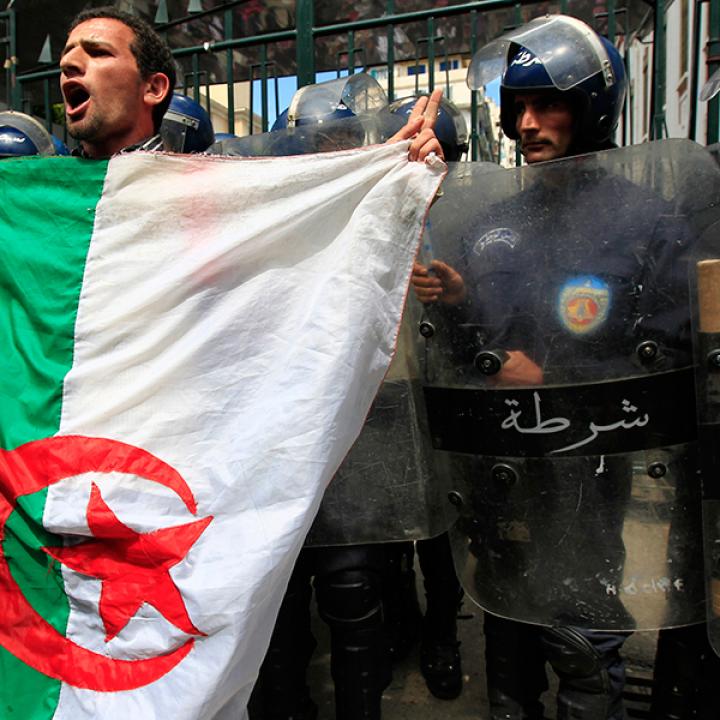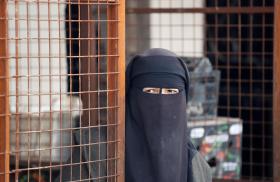
- Policy Analysis
- Fikra Forum
Algerian Opposition: Running in a Vicious Circle

April 3, 2017
As expected, several Algerian opposition parties declared they would, after all, participate in the parliamentary elections scheduled for May 4. This decision is unsurprising considering their failure to agree on a political plan that extricates the country from its crisis.
Over the past two years, the opposition managed to overcome its ideological and political differences by launching the Opposition Coordination and Follow-up Body that includes various Islamic, democratic, and nationalist parties, agreeing on the so-called Democratic Transition Project: a road map to achieve the peaceful shift in the country agreed upon by these parties during conferences in Mazafran on June 1st, 2014 and March 2nd, 2016. However, this consensus failed its first test; despite the calls to boycott the elections, many opposition forces quickly announced their intended participation, causing dispute and recriminations among the different political leaderships.
In fact, the parties were forced to participate in the elections. The only venue for the opposition to act outside of campaigns is within the parliament, where it can express resentment against the regime and ensure its appearance on media through statements and questions addressed to ministers -- questions that will ultimately end up in the dark drawers of the Speaker of the People's National Assembly, Al-Arabi Weld Khalifa. Aside from these repeated calls for an “independent body to organize and supervise the electoral process” in front of the regime, the opposition has no integrated political project to achieve a long-term strategic vision or to implement its goal of transitioning to democracy.
The other implicit option is resorting to violence to overthrow the regime. But Algerians still clearly remember the bloody events of the 1990s that caused the death of more than 200,000, and they are well-aware of the current chaos in the Arab Spring countries.
The opposition justifies its participation in the elections as an attempt to gain the tools of power, while the majority of its supporters wonder what power it will gain from an institution where the only right that a member enjoys is cashing his paycheck at the bank each month. With no real power, these parties will be no more than false witness to all bills passed by the majority.
The change sought by independent and loyal Algerians cannot be achieved through desire, hope, good intentions, or fine and intense rhetoric alone, but rather through continuous and systematic work according to a clear strategic vision, not sporadic reactions whose impacts dissipate once their cause is removed.
The opposition could, however, gain real power by supporting the independent unions that defend the rights of oppressed laborers. These unions now fight alone against laws negatively affecting the fate and future of thousands of Algerian families. The issue of the early retirement law is a perfect illustration of this; no political parties, labor unions, nor MPs managed to cancel this law except after the personal intervention of President Bouteflika, who delayed the implementation of the law to beyond 2019 when his presidential term expires. The law would increase the severity of unemployment among young people, who make up a huge percentage of the job seekers.
Access to real power also involves influential media, and in 2016 it is silly for the opposition to mourn over being banned from mainstream media outlets. Even if the opposition parties are prevented from developing their own websites, which are almost uniformly outdated, there is nothing to prevent these parties from utilizing other electronic media platforms. These are the same platforms that were used by youth to harass the regime to such an extent that the president personally warned of the consequences of this type of information. What is to stop the opposition from using these same platforms to attain more public support?
If the opposition is blaming a closed electronic media industry, then what is holding it back from establishing and producing its own media?
Remarkably, these opposition parties include dozens of wealthy individuals and businessmen - but none who invest in media. There is an urgent need for them to do so given the financial crises hitting private newspapers due to falling oil revenues. The intervention of ultra-wealthy individuals could contribute to saving dozens of newspapers on the verge of bankruptcy, and help the opposition gain access to traditional media outlets.
The real tools of power can also be accessed by establishing and creating a financial network in the form of an economic organization that competes with the government-controlled businessmen’s forum. This organization holds the opposition back from uniting its traders and businessmen under a powerful economic bloc with which it can defend its economic prerogatives and decisions.
Real power is not being isolated and secluded in closed offices and issuing statements in fancy hotels, but rather involves engaging deeply in Algerian society, feeling its concerns, supporting civil organizations and promoting charity and social work.
Parties should not only engage in political activity but also contribute to activities that highlight the cultural values that truly reveal Algerian society’s civic reality. Or is the regime preventing this too?
Who is preventing the opposition from establishing an independent think-tank that will help set its future plans, at which Algeria’s experts can convene?
While unable to officially broker agreements at the regional level, Algerian political parties can still play the role of mediator between their government and other political groups in the Maghreb region, especially Islamic parties with which they have established close ties.
In an era where whoever rejects political development will be left behind and miss any chance of progress, we can safely say that the opposition is obsolete unless it makes a radical, comprehensive review of its policies, building on the past three decades of experience in the age of the multi-party system. Unfortunately, we continue to see the same practices, speeches, and people that were present in the 1990s. Most opposition leaders view themselves as the “inspiring leader,” refusing to obey the course of history and the laws of the universe by rejecting the rotation of leadership positions and allowing the new generation of activists and youth to assume leading positions. Sadly, many opposition supporters still believe in the concept of the “infallible leader.”


